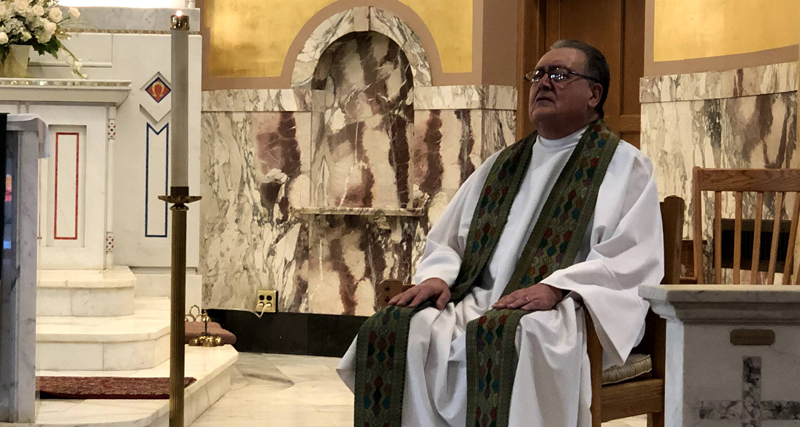By THE REV. LUIS OLGUIN
What is the “right” way to worship God so that we can be sure that we will get into heaven?
People perpetually ask some version of this question. The Bible give us more than one example:
“Which commandment in the law is the greatest?” (Matthew 22:36)
“What must I do to inherit eternal life?” (Luke 10:25)
“What must I do to be saved?” (Acts 16:30)
The “woman at the well” engaged Jesus in a conversation about where and how to properly worship God (John 4).
Discussions about what we must “do to be saved” strike a deep chord within us. Why? Because behind them is the abiding human need to feel secure. We want to know that we are OK with God, that we are doing what we are supposed to be doing.
But Jesus refused to reduce the life of faith to mere rules. Instead, He always turned these questions into discussions about relationship.
One of my favorite stories showing this is Jesus’ encounter with the scholar of the law recorded in Luke 10: 15-37. The scholar asks one of the questions above — “What must I do to inherit eternal life (verse 25)?” Jesus responds by asking another question, “What is written in the law (verse 26)?”
The scholar of the law responds, “Love the Lord your God with all your heart, and with all your soul, and with all your strength, and with all your mind; and your neighbor as yourself.(verse 27).”
This is not a list of rules. This tells us that the life of faith as God wants us to live it is about a continuing deep, loving relationship with God and with people.
Jesus acknowledges this saying, “Do this, and you will live.”
According to Jesus, loving God and others is the door to eternal life.
But the scholar of the law can’t leave it there. He comes back, asking again for rules: “And who is my neighbor (verse 29)?” In other words, which people and how many people do I have to love? Where is the line between enough and not enough? The scholar of the law wants Jesus to set some minimum standards, to tell him exactly when he can know he has done enough, when he is OK, when he is “in”.
In response Jesus tells the story of The Good Samaritan, which ends with the Samaritan committing himself to a continuing, open-ended responsibility for the injured man he has rescued (Luke 10:25-37). There is not enough in this story. Jesus is saying to the scholar of the law and to us that rules cannot describe what God asks of us. God calls us into relationship, and that consists of much more than rules.
Perhaps we think the spiritual life would be easier if there were clear rules about behavior in every situation. But Jesus always tells us that the spiritual life is not about rules, it is about relationship. Every relationship is unique, and each of us has a unique relationship with God.
Parents who have more than one child know that their children are different, that what works in a relationship with one child might not work with another. Each child relates differently to parents than his or her siblings do.
So, when we commit ourselves to loving others, we are not committing ourselves to a one-size-fits-all religious practice. We are committing ourselves to give our attention to the unique individuals around us, to listen to them, to know them, to respond to their unique needs.
No set of rules could ever fit everyone and every situation. Looking at each person and decision requires more effort and attention than responding automatically, but when we do so, we honor the other person.
Similarly, when we commit ourselves to a relationship with God, we are committing to a unique relationship that we each nurture in individual ways. We pray differently, we serve differently, we deepen our love for God by different spiritual practices.
Such indefiniteness makes some people uncomfortable. But when the jailer in Philippi asked them, “What must I do to be saved?” Paul and Silas did not give a list of rules about future behavior and practice. They invited him into a relationship, saying simply, “Believe in the Lord Jesus Christ.” They did not stipulate how that believing had to begin or what form individual believing had to take, because Christ relates to each of us uniquely.
As we follow Christ, we will learn to recognize the spirit’s nudges; we learn to recognize how God leads us individually. We cannot know where a such open-ended commitment will take us, but if we are following Christ, we can trust that our destination is somewhere deep within the heart of God.
Rules can be comforting, but the spiritual life is not about rules. It’s about relationship.
Father Luis Olguin
About: Father Luis has been in residence in the parish for more than 25 years. For a number of years he ministered to prisoners in area correctional facilities. He also has served in several locations around the world.
Native land: Chile.
Education: Attended Catholic schools for 12 years; graduated from Catholic University with a degree in civil engineering; attended Florida International University in Miami for two years and earned a degree in philosophy; graduated seminary in San Rafael, Chile.
Family: Three brothers, three sisters and 14 nieces and nephews.
